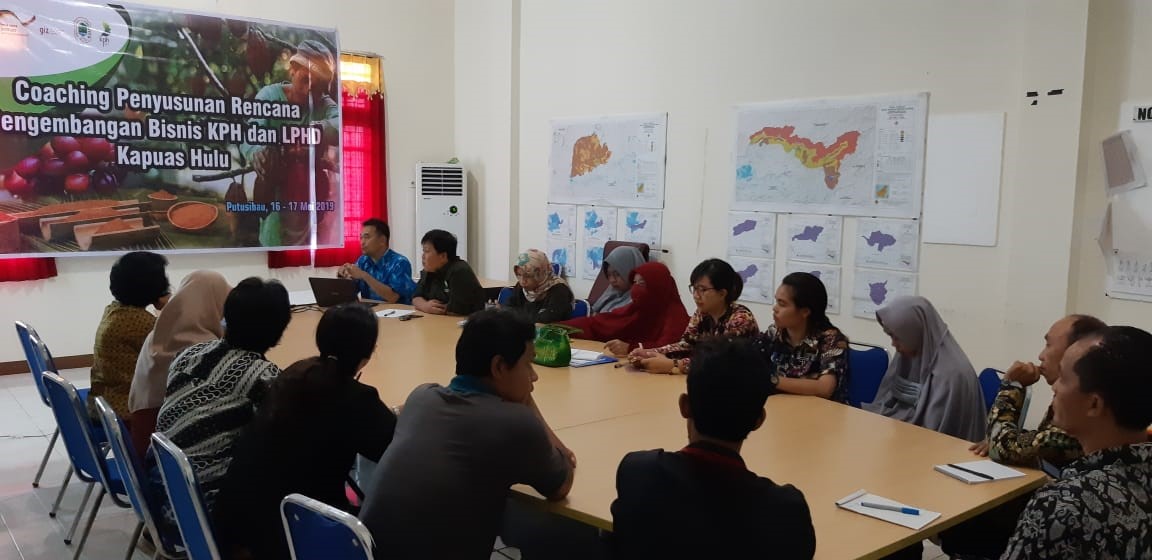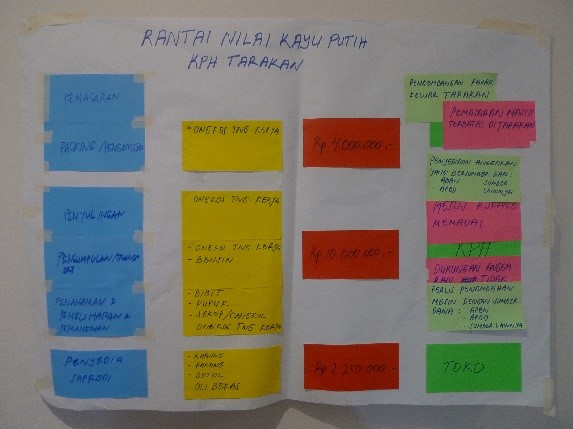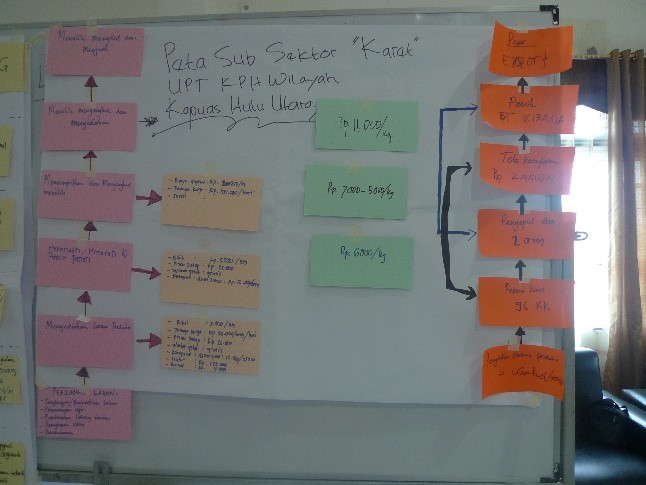
According to FORCLIME’s objectives both capacity development of Forest Management Units shall be supported and living conditions of rural communities be improved. This can be achieved through strengthening of qualifications needed e.g. entrepreneurial capabilities contributing to local stakeholders managing forest resources in a sustainable way. As a couple of social forestry schemes have been granted by the Ministry of Environment and Forestry and more will follow a growing number of local communities are legally entitled to manage these resources independently.
Since entrepreneurship is a broad field a comprehensive programme was needed to cover the most important aspects of the subject. This includes identification of suitable commodities, development of supply chains, means of processing and packaging, marketing of products and cooperation among likeminded farmers. At the same time any business setup should aim on sustainability in order to create long-term jobs and permanently generate income for the actors involved. To ensure a practical approach the training should include theory and practice and at the same time give support looking at individual concepts focussing on potentials existing locally by revising business ideas and providing coaching sessions.
The activity was basically aiming on three target groups:
1. As the ones to develop their own business and generate income local communities were addressed directly. Representatives of different villages should pick up useful knowledge to take home, implement individually but also as multipliers pass it on to other community members.
2. Forest Management units (FMU) are considered to function as public service providers giving technical support to local stakeholders in all matters affecting sustainable forest management and use of natural resources deriving from in and around their forests. For this kind of extension service comprehensive qualifications including entrepreneurial competencies are needed.
3. Teachers of the regional Government Forestry Training Centres (BDLHK) will be the responsible persons to in future regularly provide training to FMU-staff in order to equip them with knowledge needed to fulfil their consulting mission. They should specialize on certain topics to pass on the relevant knowledge and work as moderators supporting forest service extension officers.
The implementation of the training program was entrusted to an Indonesian consulting company, which has the necessary skills and experience. Because participants can usually be made available for a week at the most due to other commitments and obligations it was important to divide the further training measure into several consecutive modules that build on each other. Hence the entire series of training events consisted out of a one-week basic training workshop, follow up by a two-days coaching event that was implemented after several weeks only. For participants, who would later act as multipliers passing on their knowledge to others, a one-week advanced course was also carried out.
The components included different topics to deal with intending to enable participants to acquire basic knowledge and develop simple business models. During the basic workshop the following topics was dealt with:
- Entrepreneurship and establishment of forest-based commodity business.
- Value Chain Approach
- Rapid market assessment of selected non-timber forest products and
- Business Strategy and Business Plan.

The last aspect should be further elaborated following the basic course. With regard to a commodity that is available in the participants’ home area a business plan should be developed and elaborated further. During a follow-up event (“coaching workshop”) this concept had to be presented and justified. The group of participants should then question the concept and point out any existing weak points in order to subject it to a reality check.
The last component of the training programme (“advanced training”) was following the train-the-trainer approach focussing on providing deeper insights in business related issues. This kind of knowledge should be given primarily to the representatives of the FMU and training centres in order to strengthen them in their intended role as advisers. The module included topics like:
- product development
- marketing (including web-based solutions) and
- organisational development.
The latter subject seems to be of utmost importance to promote cooperation and a common strategic orientation of producers of the same commodity. By setting up organizations like associations, cooperatives or any other type of joint platform representing the interests of its members it should be possible to strike a fair balance between the positions of producers and customers and to avoid any unfair dependencies.

All participants mainly originating from West Kalimantan and North Kalimantan got involved with high motivation during the sections of the training programme. Practical exercises with a high relevance to reality focussed on commodities available in the regions including honey, tengkawang (illipe nut), rattan as well as agarwood, cacao and eco-tourism. Since this is just a selection of potential products further research and development as a follow-up is needed. And although the training program was comprehensive and intensive comprising 7 (basic training and coaching) or 12 days (including advanced training), there is a need for further consultation. In future it will be one of the tasks of the Indonesian Forest Management Units to give this advice to the local communities in order not only to encourage production and create business opportunities for rural communities but also provide permanent consultation for necessary adjustments to changing business environments. For this they shall be updated and supported by the regional forest training centres (BDLHK) implementing further training events and transferring additional knowledge and essential information.
For more information, please contact:
Lutz Hofheinz, Strategic area manager, forest management unit development
Mohammad Sidiq, Coordinator North Kalimantan Province
Jumtani, Coordinator West Kalimantan Province






